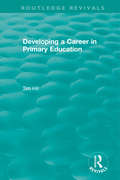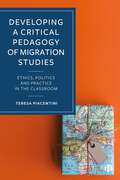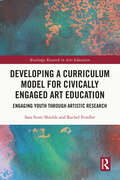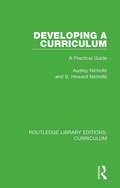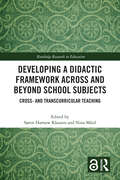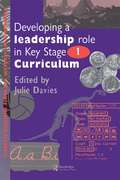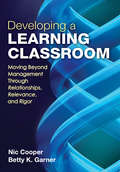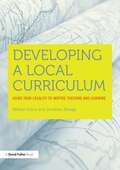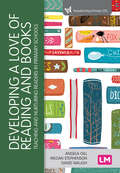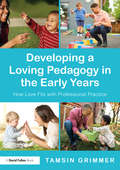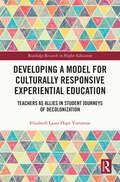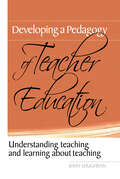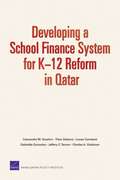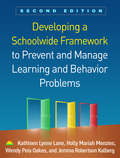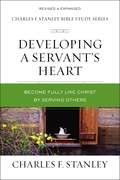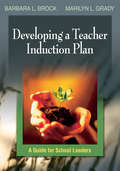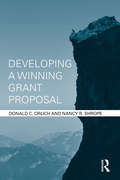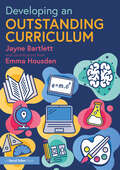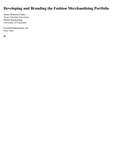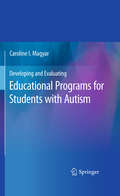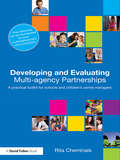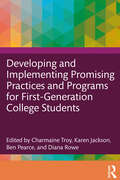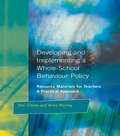- Table View
- List View
Developing a Career in Primary Education (Routledge Revivals)
by Tim HillPublished in 1994, this book provides both information and guidance for teachers and students looking to advance their careers in primary education. The author considers the opportunities which exist, showing teachers how to develop their careers in ways which fulfil a variety of ambitions. The author draws on research evidence about teachers’ work and careers, including his own survey of primary school headteachers. The issue of equal opportunities is addressed at each career stage, and advice is given on effective presentation of job applications and performance at interview.
Developing a Critical Pedagogy of Migration Studies: Ethics, Politics and Practice in the Classroom
by Teresa PiacentiniMigration as a taught subject is entrenched in social and political debates, with the classroom firmly framed as a site of committed social and political encounter. That means teaching migration through the prism of critical pedagogy is a political and ethical necessity. This book invites readers to examine their own relationships with migration, ethics, politics and power. It encourages teachers, students and practitioners to think critically about their position in relation to the knowledge they both bring and gain. With pedagogical features that provide space for reflection and discussion, this is a transformative resource in reshaping how we teach and learn about migration.
Developing a Curriculum Model for Civically Engaged Art Education: Engaging Youth through Artistic Research (Routledge Research in Arts Education)
by Sara Scott Shields Rachel FendlerThis volume explores art as a means of engendering youth civic engagement and draws on research conducted with young people in the United States to develop a unique curriculum model for civically engaged art education (CEAE). Combining concepts from civics and arts education, chapters posit that artistic thinking, making, and acting form the basis for creative research into social and political issues which affect young people and are key to promoting civic participation. Focusing on critical, creative, and dynamic forms of youth cultural production inspired by local people, places, and events, the text demonstrates how educators’ curricular choices can engage students in researching social movements and arts-based activism. The authors draw from well-established areas such as arts-based research, civic engagement, and maker-centered learning to present their educational model through illustrative examples. Offering a timely consideration of the relationship between art education and civics education, this book will appeal to scholars and students of the sociology of education, as well as arts and teacher research, and pre-service teacher education.
Developing a Curriculum: A Practical Guide (Routledge Library Editions: Curriculum #24)
by Audrey Nicholls S. Howard NichollsOriginally published in 1972. This is a practical and comprehensive guide to planning and developing a curriculum which will give both professional and prospective teachers a clearer insight into this vital part of the teacher's role. The study of objectives, selection and organisation of content and methods, evaluation, the total situation, various settings for curriculum development and the advantages of co-operative curriculum planning are among the aspects considered but they are always linked to the school and classroom situation with frequent examples of curriculum development based on the principles outlined. The authors’ wide experience of helping teachers plan their own curriculum and their first-hand experience of curriculum development projects makes them well placed to understand the problems confronting the teacher.
Developing a Didactic Framework Across and Beyond School Subjects: Cross- and Transcurricular Teaching (Routledge Research in Education)
by Søren Harnow Klausen Nina MårdCentered around a contemporary conception of Bildung, this book effectively demonstrates how the aims of cross- and transcurricular teaching can be reconciled, resulting in a didactic framework for teaching and learning in secondary schools that can be applied internationally. Chapters present a nuanced and unified approach to fusing theory and practice by offering accounts of some of the most promising teaching methods from leading scholars in the field of curriculum research. These methods include dialogic teaching or movement integration, transversal competences like digital or entrepreneurial thinking, and topics that call for crosscurricular approaches, like sustainability or citizenship. Addressing diverse worries and criticisms of crosscurricular teaching, the book includes international viewpoints and trends such as sustainability, citizenship, and student motivation to present a comprehensive and systematic scholarly treatment of crosscurricular didactics within the classroom. It further addresses important challenges that have been widely ignored, like how to evaluate crosscurricular work. Ultimately, this volume makes a highly novel contribution to the field of crosscurricular didactics, and will be of interest to researchers, scholars, and academics in the fields of secondary education teaching and learning, educational science, and curriculum design. Those interested more broadly in the theory of education will also find the volume of use. The Open Access version of this book, available at www.taylorfrancis.com, has been made available under a Creative Commons Attribution- Non Commercial-No Derivatives (CC-BY-NC-ND) 4.0 license.
Developing a Leadership Role Within the Key Stage 1 Curriculum: A Handbook for Students and Newly Qualified Teachers
by Julie DaviesSince 1989 initial teacher training courses in England and Wales have included teacher preparation for taking a lead in a school subject area in their first appointment. There is no longer a place for a teacher newly qualified or not in primary schools whose sole responsibility is for his or her own class. A teacher must have specific specialist knowledge and expertise in particular subjects which must be shared with all staff.; This text contains the latest curriculum and assessment changes. It aims to help students and newly qualified teachers to understand the complexities of being a co-ordinator of the National Curriculum subjects in the early years of schooling and reports on best practice.
Developing a Learning Classroom: Moving Beyond Management Through Relationships, Relevance, and Rigor
by Ned A. Cooper Betty K. GarnerDiscover powerful ways to connect with your students!All too often, managing a classroom means gaining control, dictating guidelines, and implementing rules. Designed for any teacher struggling with student behavior, motivation, and engagement, Developing a Learning Classroom explores how to create a thriving, learning-centered classroom through three critical concepts?relationships, relevance, and rigor. Discover how you can:Develop an interactive learning mindsetCreate a safe environment where students question, explore, and discover Uncover a student′s learning profile as well as your own teaching styleUse student input to create classroom practices and procedures Apply brain-based instructional strategies to keep students engagedUse student surveys and a personal education plan to improve learning environmentsFilled with classroom stories, starter worksheets, and action steps, this book reveals the secrets to transforming an ordinary classroom into an extraordinary learning community!
Developing a Learning Classroom: Moving Beyond Management Through Relationships, Relevance, and Rigor
by Ned A. Cooper Betty K. GarnerDiscover powerful ways to connect with your students!All too often, managing a classroom means gaining control, dictating guidelines, and implementing rules. Designed for any teacher struggling with student behavior, motivation, and engagement, Developing a Learning Classroom explores how to create a thriving, learning-centered classroom through three critical concepts?relationships, relevance, and rigor. Discover how you can:Develop an interactive learning mindsetCreate a safe environment where students question, explore, and discover Uncover a student′s learning profile as well as your own teaching styleUse student input to create classroom practices and procedures Apply brain-based instructional strategies to keep students engagedUse student surveys and a personal education plan to improve learning environmentsFilled with classroom stories, starter worksheets, and action steps, this book reveals the secrets to transforming an ordinary classroom into an extraordinary learning community!
Developing a Local Curriculum: Using your locality to inspire teaching and learning
by Jonathan Savage William EvansHow can your local area become a source of inspiration for curriculum development? How can it enhance the teaching and learning at your school? Developing a Local Curriculum explores how your local area and its resources can be used as a stimulus and inspiration for curriculum development. It examines the ways in which the geography, history, culture and people within your local area can enrich the learning experiences offered to students to make them more relevant and meaningful. Drawing on a wide range of examples from schools already taking this approach, the book shows show how the rich histories and cultures of individual subjects can be developed through an understanding of the local area. It also reveals how engaging with the 'local' in education can help restore young people's sense of identity and community. Features include: · practical guidance on engaging with the local community in innovative ways · suggestions for local cultural activities such as architecture, digital arts, theatre and film · ways to develop effective partnerships with local businesses and charities · detailed case studies showing how schools put the ideas described into practice This exciting new book aims to inspire you to develop a curriculum that is meaningful for pupils and gives them a strong sense of connection with their local area and understanding of its past, future and present.
Developing a Love of Reading and Books: Teaching and nurturing readers in primary schools (Transforming Primary QTS Series)
by David Waugh Angela Gill Megan Stephensonnursing children read for pleasure and develop a life-long love of reading is a priority for all primary school teachers. The National Curriculum focuses heavily on promoting reading for pleasure and engaging pupils using a range of diverse and inclusive texts and materials. This text supports trainee teachers working towards primary QTS and Early Career Teachers to understand the importance of supporting children to become readers, enjoy reading for pleasure and develop higher level reading skills. It includes guidance, case studies and theoretical perspectives to show trainee teachers how they can develop children’s reading.
Developing a Loving Pedagogy in the Early Years: How Love Fits with Professional Practice
by Tamsin GrimmerCare and caring are key to early childhood education and yet love can be viewed as a taboo word within early childhood settings. This book guides practitioners through the potentially problematic area of loving the children they care for. It shows where a loving pedagogy can fit within professional practice and how this can enrich experiences for children and educators. The book explores how educators can support their children by holding them in mind, valuing them and promoting their best interests. Focusing on how relationships, attachment and connections underpin our settings and practice, the chapters cover: the fundamentals of professional love appropriate touch in practice the different ways in which children feel loved the rights of the child empowering children through love working with parents and carers. Including case studies and questions for reflection, this is vital reading for practitioners wanting to develop a nurturing and loving pedagogy that places the child at the centre of their practice.
Developing a Model for Culturally Responsive Experiential Education: Teachers as Allies in Student Journeys of Decolonization (Routledge Research in Higher Education)
by Elizabeth Laura YomantasThis book provides a new, empirically informed framework designed to equip higher education faculty with the tools to help students engage in humanizing, mutually beneficial, and anti-colonial experiential education alongside other students and communities around the world. The author maps the conceptual development of culturally responsive experiential education (CREE) as a novel framework, situated at the nexus of culturally responsive research methodologies, the Indigenous research paradigm, critical service learning, and critical pedagogy in experiential education. The chapters detail qualitative research findings from an undergraduate CREE program in rural Fiji to illustrate the implementation of the novel CREE framework and discuss post-program possibilities based on the research study findings. Situated in narrative inquiry, the book also includes interspersed participant vignettes in order to center student voices and illuminate the research study findings. With attention to themes including emergent critical consciousness, critical allyship, and personal journeys of decolonization as experienced through the CREE framework, it will be of benefit to both education scholars and higher education faculty interested in experiential education and culturally responsive pedagogies.
Developing a Pedagogy of Teacher Education: Understanding Teaching & Learning about Teaching
by John LoughranA pedagogy of teacher education must go well beyond the simple delivery of information about teaching. This book describes and explores the complex nature of teaching and of learning about teaching, illustrating how important teacher educators' professional knowledge is and how that knowledge must influence teacher training practices. The book is divided into two sections. The first considers the crucial distinction between teaching student-teachers and teaching them about teaching, allowing practice to push beyond the technical-rational, or tips-and-tricks approach, to teaching about teaching in a way that brings in the appropriate attitudes, knowledge and skills of teaching itself. Section two highlights the dual nature of student teachers’ learning, arguing that they need to concentrate not only on learning what is being taught but also on the way in which that teaching is conducted.
Developing a School Finance System for Ka-12 Reform in Qatar
by Louay Constant Jeffery C. Tanner Titus Galama Gabriella C. Gonzalez Cassandra M. GuarinoReform-minded leaders of Qatar, who have embarked on a sweeping reform of their nation's education system, asked RAND to evaluate their education finance system and offer suggestions for improvements. The authors analyze the system's evolution and resource allocation patterns between 2004 and 2006 and develop analytic tools for performing the evaluation, including a framework that allows assessment of the system in light of six main objectives.
Developing a Schoolwide Framework to Prevent and Manage Learning and Behavior Problems, Second Edition
by Kathleen Lynne Lane Holly Mariah Menzies Wendy Peia Oakes Jemma Robertson KalbergNow revised and expanded, this volume explains how to design, implement, and evaluate a comprehensive, integrated, three-tiered (Ci3T) model of prevention. Rather than presenting a packaged program, the book provides resources and strategies for designing and tailoring Ci3T to the needs and priorities of a particular school or district community. Ci3T is unique in integrating behavioral, academic, and social–emotional components into a single research-based framework. User-friendly features include tools for collecting and using student and schoolwide data; guidance for selecting effective interventions at each tier; detailed case examples; and tips for enhancing collaboration between general and special educators, other school personnel, and parents. In a convenient large-size format, the volume includes several reproducible forms that can be downloaded and printed for repeated use. Prior edition title: Developing Schoolwide Programs to Prevent and Manage Problem Behaviors. New to This Edition *Updated step-by-step approach reflecting the ongoing development of Ci3T. *Chapter on evidence for the effectiveness of tiered models. *Chapter on low-intensity, teacher-delivered strategies. *Chapter on sustaining effective implementation and professional development. *"Lessons Learned" feature--reflections and examples from educators in a range of settings.
Developing a Servant's Heart: Become Fully Like Christ by Serving Others (Charles F. Stanley Bible Study Series)
by Charles F. StanleyHow to serve with generosity and love.Service is giving, and giving is the very essence of the gospel. God gave His only begotten Son. Jesus gave His life on the cross. The Holy Spirit gives us the power to resist sin and follow God's commands. It is from this abundance of what we have been given that God calls us to freely give ourselves—to actually develop a mindset in which we look first to the needs of others above our own interests.In Developing a Servant's Heart, Dr. Charles Stanley shows how each of us have been equipped, empowered, and charged to do this as we follow the example of Jesus—the Supreme Servant.With over 1 million copies sold, the Charles F. Stanley Bible Study Series is a unique approach to Bible study, incorporating biblical truth, personal insights, emotional responses, and a call to action.Each study draws on Dr. Stanley&’s many years of teaching the guiding principles found in God&’s Word, showing how we can apply them in practical ways to every situation we face. This edition of the series has been completely revised and updated, and includes two brand-new lessons from Dr. Stanley.Each of the twelve lessons includes:Overview: A brief look at what is covered in the lessonLife's Questions: A teaching from Dr. Stanley that unpacks the topic of the lessonLiving the Principle: Application and Bible study questions based on the key pointsReflection: Key takeaways to put into practice today and tomorrow
Developing a Talent for Science
by Ritsert C. JansenWant to make the most of your talent for science? This practical guide for students, postdoctorates and professors offers a unique stepwise approach to help you develop your expertise and become a more productive scientist. Covering topics from giving presentations and writing effectively to prioritising your workload, it provides guidance to enhance your skills and combine them with those of others to your mutual benefit. Learn how to maintain your passion for science, inspire others to develop their abilities and motivate yourself to plan effectively, focus on your goals and even optimise funding opportunities. With numerous valuable tips, real-life stories, novel questionnaires and exercises for self-reflection, this must-read guide provides everything you need to take responsibility for your own personal and professional development.
Developing a Teacher Induction Plan: A Guide for School Leaders
by Dr Marilyn L. Grady Dr Barbara L. BrockTo combat the growing challenge of teacher attrition, induction experts Brock and Grady offer a multiyear, step-by-step induction program for retaining and developing beginning teachers.
Developing a Winning Grant Proposal
by Donald C. Orlich Nancy R. ShropeIn a world of tightening budgets and increased competition for grant money, Developing a Winning Grant Proposal provides the guidelines, strategies, plans, and techniques to craft a fundable grant proposal. A user-friendly, engaging, and up-to-date guide, this book covers the entire process from the inception of a good idea, to the formulation of a strong proposal, to the next steps once a proposal is funded. Providing a basic overview and helpful tools for busy faculty and researchers, this is a must-have guide for anyone interested in the mechanisms that successful grant writers employ. Special Features Include: Appendices with a "Model of a Funded Proposal" and a "Basic Toolbox for Grant Seekers" Checklists for self-evaluating the efficacy of each portion of the grant proposal Coverage of complex issues in a concise and clear manner, perfect for grant writers facing tight time constraints.
Developing an Outstanding Curriculum (Becoming an Outstanding Teacher)
by Jayne Bartlett Emma HousdenOur role as educators is to develop a curriculum which facilitates outstanding learning and which builds social, cultural and educational capital. The curriculum is much more than a content driven document, it is the vehicle for educational change. This book compliments the Make it Outstanding Series and is central to subject development. It has a strong focus on combining curriculum theory and translating this to a practical approach schools can adapt and implement with ease. Packed full of practical strategies and examples to facilitate curriculum conversations within subject and senior leadership teams the chapters provide a considered balance between theory and application. Supporting teachers, curriculum leaders, senior leaders and headteachers in leading and implementing the curriculum within their schools, the book covers: An overview of different curriculum models How to develop the curriculum intent from the whole school vision Developing the composite and component structure How we implement the curriculum with a focus on learning episodes How we assess the curriculum Social, cultural and educational capital How we quality assure the curriculum Developing an Outstanding Curriculum is an essential read for all teachers, curriculum leaders, senior leaders, and headteachers who want to ensure that they drive the development of an outstanding curriculum.
Developing and Branding the Fashion Merchandising Portfolio
by Phyllis Borcherding Janace E. BuboniaA career in fashion merchandising means working in a fast-paced, creative industry-and a highly competitive one. Developing and Branding the Fashion Merchandising Portfolio is a guide to creating a portfolio and brand for yourself that will stand out. <p><p>Portfolios provide immediate visual evidence of what you can do, and they communicate hands-on experience more explicitly than a résumé can on its own. Whether you're interested in design, product development, buying, textile design, or trend forecasting, this book provides activities to help you identify and focus your skills. <p><p>Step-by-step instructions demonstrate how to gather examples of your work, how to choose a design and layout, and ways to incorporate drawings, sketches, and CAD-generated material into a consistent, streamlined portfolio that reflects your personality. User friendly and above all visual, this is the guide for creating a portfolio that will get you hired-and keep your career on track.
Developing and Evaluating Educational Programs for Students with Autism
by Caroline I. MagyarRecent years have witnessed a marked increase both in the number of children diagnosed with autism spectrum disorders (ASDs) and those placed alongside their typically developing peers in general education classrooms. These events bring with them a plethora of challenges, particularly in the areas of program design and educational practices. Developing and Evaluating Educational Programs for Students with Autism offers systematic, evidence-based guidelines--as well as tools, checklists, and other resources--for creating effective learning environments for students across the autism spectrum and the grade span. Planning, development, implementation, and continuous evaluation are examined in detail in this practical volume, which features: An overview of the ASDs, with an emphasis on effective educational practice.In-depth discussion of the ASD Program Development and Evaluation Protocol.A staff training model for personnel working with students with ASD.A detailed framework for student support teams and family-school collaboration.Specific guidelines for conducting needs assessments and student evaluations.* Case examples of applications of the protocol on the program, school, and regional levels. Developing and Evaluating Educational Programs for Students with Autism is a uniquely rigorous and thorough reference benefiting school psychologists and special education professionals as well as those in allied educational and mental health fields, including clinical child, school, and developmental psychologists, psychiatrists, and other professionals working with children with autism.
Developing and Evaluating Multi-Agency Partnerships: A Practical Toolkit for Schools and Children's Centre Managers
by Rita CheminaisIn recent years government initiatives such as Sure Start, Extended Schools and Every Child Matters have been significant in the promotion of an agenda to create collaborative working environments and introduce multi-agency practice into a range of child-centred settings. Developing and Evaluating Multi-Agency Partnerships provides advice and guidance for managers and leaders responsible for overseeing multi-agency working in these settings, providing a self-evaluation framework to help improve the quality and effectiveness of multi-agency relationships. The valuable tools and templates within this book will: Explain the importance of self-evaluation Provide a framework for self-evaluation via a step by step guide Link multi-agency practice with improving the Every Child Matters outcomes Suggest best practice for gathering multi-agency evidence Give guidance on building a portfolio of evidence and achieving external recognition The self-evaluation framework provided in this book meets the requirements of the Children’s Workforce standards and OFSTED requirements for effective partnerships. A highly practical handbook, this book is essential reading for all those who are implementing or improving a multi-agency partnership in their setting. To improve the effectiveness of this resource, additional resources are downloadable in customisable form from http://www.routledgeteachers.com/resources/fulton
Developing and Implementing Promising Practices and Programs for First-Generation College Students
by Charmaine Troy, Karen Jackson, Ben Pearce, and Diana RoweAs first-generation students gain greater access to higher education, faculty, and staff at colleges and universities must provide intentional engagement that supports their persistence and graduation. This book serves as a guidebook for higher education practitioners seeking to implement or enhance first-generation programming at their institutions. The chapters provide detailed descriptions of the development, implementation, and assessment of programs and practices intended to support the success of first-generation college students. Authors share insights on building allies, identifying and working through challenges, and applicable takeaways for implementing similar practices and programs at the reader’s own institutions. Programming discussed in the book ranges in funding levels and includes activities such as faculty dinners, study abroad, bridge programs, living learning communities, peer mentoring, intrusive advising, and holistic well-being. This valuable resource helps higher education practitioners better support and position first-generation students for success.
Developing and Implementing a Whole-School Behavior Policy: A Practical Approach
by Anne Murray Don ClarkeFirst Published in 1997. Routledge is an imprint of Taylor & Francis, an informa company.
